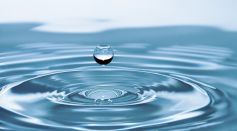CHEMISTRY

Acidity of Molecules Measured Using New Technique; Will Help Determine Substance's Chemical Behavior

World's Oldest Water Found in Canada Sheds Light on the Beginning of Life

Pesticides Exposure Increases Susceptibility to COVID-19, Study Finds

New Non-Toxic Hydrogels Can Remove Graffiti from Street Art Without Destroying It

Lobster Underbellies Inspired MIT Engineers to Make Better Hydrogel for Artificial Tendons

American Honey Still Contains Nuclear Fallout From Bomb Tests Decades Ago
First True Biodegradable Plastic Disintegrates in Heat, Water in Just a Few Weeks

Japan’s Fukushima Wastewater Will Slowly Be Released to the Pacific Ocean Over the Next Decades

Heavy Water Tastes Sweet: Could This Be a New Sweetener But Without the Calories?
Dangerous Algal Toxin Named 'Very Fast Death Factor' Now Also Found in Air

Mummies on Parade: Egypt Dismisses Myth on Pharaoh's Curse for Recent Unfortunate Incidents
Carbon-ring Chemicals Essential to Life Found in Space for the First Time

Ocean Oil Spills Photooxidizes Much Faster Than Previously Thought
Scientists Propose New Method for Finding Rare Earth Deposits
Most Popular

Can We Bring Back Extinct Animals? How De-Extinction Science and Technology Work

Why Do Stars Explode? Supernova Formation and the Final Stage of a Star Lifecycle

The Air Pollution Climate Link: What Environmental Science Reveals About Our Changing Planet

Extreme Heatwaves Explained: What Extreme Heat Science Reveals About Our Changing Climate




